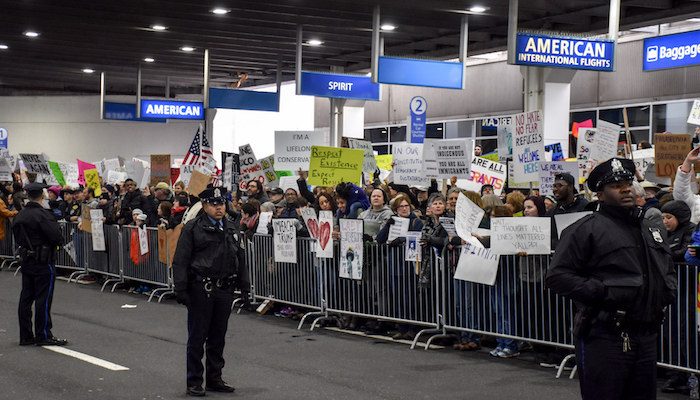
Almost everyone I know has written an editorial, an opinion piece, a blog post, or a letter to the editor arguing that President Trump’s executive order that bans entry to the United States from seven Muslim countries is ineffective and dangerous. In terms of actually stopping entry of terrorists, the justification the president offered for his action, these friends are likely correct in believing that the order will not work. As most point out, the list of affected countries omits two—Saudi Arabia and Pakistan—that have been the biggest sources of terrorists that have attacked the United States. Moreover, as they usually also note, most attacks in the United States have come from terrorists who were citizens or legal residents who self-radicalized and who supposedly had little or no direct contact with externally based terrorist organizations.
The dangerous part stems from the belief that President Trump’s ban, temporary or not, blocked or not on legal grounds, will become a recruiting incentive for terrorists. As the seven countries are Muslim majority states, adherents to the religion will, it is argued, feel the insult and want to strike back. President Trump’s dismissal of the argument—“they already hate us”—only confirms his misdirection in their eye.
There are, however, other perspectives to consider. One is that President Trump is fulfilling at least partially one of his campaign pledges with the temporary ban. During rallies, he drew long cheers by often saying that we ought to ban Muslim entry into the United States until officials can determine ways to screen arrivals and safeguard Americans. Such a religious test is both wildly impractical and wildly illegal. No one knows what others really believe. And no one should want the government trying to find out what religious beliefs people hold. Temporarily blocking entry from some Muslim majority countries and the acceptance of refugees avoids the religion test. It is unfair, possibly even harmful, to many, but the ban responds to deep fears within the American public and will surely be rescinded with the official recognition that blanket bans do not work and are not needed. Box checked.
Also the public in the affected countries may see the ban as understandable, not sinister as do my friends. Last year the United States conducted more than 25,000 air strikes in seven countries (five of which made the ban list—Somalia, Yemen, Libya, Iraq and Syria—Pakistan and Afghanistan did not). Our professions of altruistic motives must ring a bit hollow. Closing an open door to those who live in lands where hatred of America runs deep must seem more genuine.
And back in the United States we need to recognize that friends and family of lone wolves often know of their radicalization and murderous intent. Many in the Muslim American community do cooperate with authorities and report concerns. The ban reflects fears attacks generate and the collective punishments that they can cause. Terrorism terrorizes. The public’s desire for protection will provoke a political response. The ban is a message to friends and family of terrorists.
Further Reading on E-International Relations
- Making Sense of the 2020 US Election
- Opinion – The Path Beyond Trump in US Human Rights Policies
- Opinion – Nationalism and Trump’s Response to Covid-19
- Opinion – Iran at the Crossroads Pending Trump’s Return
- Wrecking Ball-In-Chief: Trump’s Withdrawals from International Commitments
- Opinion – Trump’s Effective China Strategy